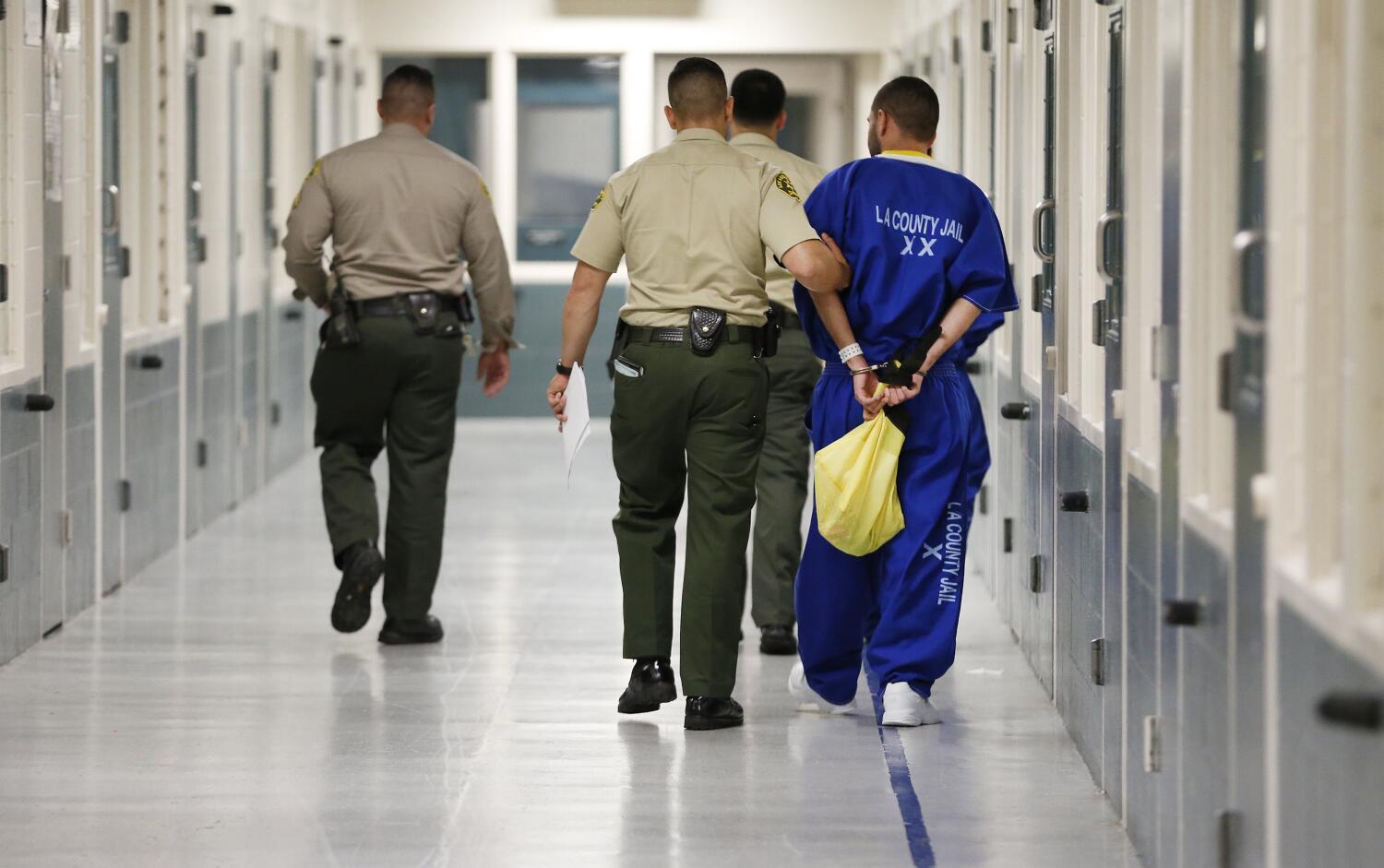-
North Korea Unveils the Completed Hull of What It Calls a Nuclear Submarine - 42 mins ago
-
San Diego man killed by falling tree in third storm-related death - 46 mins ago
-
Mike McCarthy Doesn’t Hold Back About Steelers With Playoffs Looming - 56 mins ago
-
Why China, a One-Party State, Is Backing Elections in This Country - about 1 hour ago
-
Aaron Rodgers Urges NFL to Make Big Change After DK Metcalf Incident - 2 hours ago
-
A Million More Epstein Documents Have Been Found, Justice Dept. Says - 2 hours ago
-
Peng Peiyun, 95, Dies; Official Renounced China’s One-Child Policy - 3 hours ago
-
Woman rescued after she is swept nine miles in San Jose Creek during SoCal storm - 4 hours ago
-
Former Broadway Child Actress, 25, Killed in New Jersey Stabbing - 4 hours ago
-
The Epstein File Drop Is Not About Justice - 4 hours ago
Officials question sheriff’s report on sex abuse in L.A. jails

There hasn’t been a “substantiated” allegation of sexual abuse by staff against an inmate in the nation’s largest jail system since 2021.
At first glance, the statistic — based on Los Angeles County Sheriff’s Department data — might appear to indicate that a federal law called the Prison Rape Elimination Act has finally accomplished its mission more than two decades after it was enacted by Congress.
But a broad array of local oversight officials and advocacy groups are raising eyebrows over the claim, and bringing new scrutiny to how the Sheriff’s Department investigates allegations of sexual abuse made by inmates against their jailers.
L.A. County incarcerates about 13,000 people — including roughly 1,500 women — throughout its network of jails watched over by sheriff’s deputies.
Sheriff’s Department records show that between January 2022 and September 2025, inmates filed 592 allegations of abuse and harassment against staff. None were deemed “substantiated,” which the Sheriff’s Department defines on its website as “an allegation that was investigated and determined to have occurred.”
The suggestion that there has not been enough evidence to support even one alleged incident by staff against an inmate in nearly four years has struck some tasked with monitoring the Sheriff’s Department as absurd.
“When you have this many complaints and you have zero that are founded, there is something wrong with the process,” said George B. Newhouse, a member of the L.A. Sheriff Civilian Oversight Commission.
L.A. County’s Office of Inspector General and advocacy groups, including the Anti-Recidivism Coalition and Peace Over Violence, also shared concerns about the lack of substantiated allegations during a Nov. 4 virtual discussion of the federal Prison Rape Elimination Act, or PREA. The law was enacted in 2003 in an effort to reduce widespread sexual abuse behind bars.
In 2012, the federal government instituted a set of rules known as PREA standards, which laid out steps that jail and prison operators are required to take to prevent and reduce sexual abuse and harassment between inmates and staff.
L.A. County Sheriff’s Department Sgt. Ryan Vaccaro said the department “has zero tolerance for sexual abuse and sexual harassment.” He added that monthly town hall meetings are held in jails to educate inmates about PREA and record any questions and complaints they have about the federal standards.
“Our team is dedicated to ensuring our residents know we have a zero-tolerance policy and know how to get help when they need it,” he said. “All PREA allegations are documented and processed promptly, thoroughly and objectively.”
During a public meeting last month, Hans Johnson, the chair of the Civilian Oversight Commission, pressed John Barkley, assistant director and PREA coordinator at the Sheriff’s Department, to explain the lack of substantiated reports, and how long it typically takes for allegations to be investigated.
Dozens of the harassment and abuse claims identified in the sheriff’s department records are listed as “pending,” which the department defines on its website as an “allegation still under investigation.”
“It kind of beggars credulity that that number of complaints could be raised and that none could be substantiated,” Johnson said. “It’s just a red flag.”
Barkley said “every case is investigated” and found to be either “substantiated, unsubstantiated or unfounded.” He said “every situation is different. The thing that we’re mandated to do is to do the investigation promptly and to do it thoroughly.”
In a statement a colleague read aloud at the Nov. 4 forum, Portland, Ore., resident Frank Mendoza said that while he was incarcerated at L.A.’s Twin Towers Correctional Facility in 2006, “officers at the jail repeatedly harassed me because I was openly gay” and one beat and raped him in his cell.
“I was then left in the cell naked, bloodied, and completely humiliated,” Mendoza said in his statement. “I tried to report what happened. First, I told the officer on the next shift who found me on the floor of my cell, and all he did was order me to get dressed. That was the norm. Officers didn’t tell on one another.”
Mendoza alleged he wasn’t provided medical treatment or examined for injuries caused by the assault. When he reported the rape, he found that “without a forensic exam, it was impossible to build a criminal case.”
Now, Mendoza gives voice to other people who have been victims of sexual abuse and harassment while incarcerated through his advocacy work as a member of Just Detention International’s Survivor Council.
“It’s clear the county still has a lot of work to do to ensure the safety of people in detention,” he said. “At the same time, the fact that such a hearing is happening is evidence to me of a culture shift and that people are listening.”
The Sheriff’s Department also tracks inmate-on-inmate allegations, which accounted for 296 reports of sexual abuse or harassment between January 2022 and June 2025. Of those, 28 were classified as “substantiated.”
The numbers have spiked since then, with 82 inmate-on-inmate allegations between July and September 2025. Of those claims, the department deemed five involving sexual abuse to be “substantiated,” along with another five claims of sexual harassment.
During that three-month period, inmates made 121 sexual abuse and harassment claims against staff, none of which have been identified as “substantiated” by the Sheriff’s Department.
Arthur Calloway, co-vice-chair of the Civilian Oversight Commission, asked at the October meeting whether the sheriff’s department could be trusted to investigate inmate claims against its own employees.
He added that, “if it was all objective, there would be some substantiated ones actually to trickle out” from claims filed since January 2022.
Barkley responded that “many of those” unsubstantiated outcomes are “dictated on whether the D.A. takes the case.” He added that “if the D.A. decides that they’re not going to prosecute the case with inmate-on-inmate, then it is going to be an unsubstantiated.”
The L.A. County district attorney’s office said in a statement that the Sheriff’s Department first conducts internal investigations of allegations of criminal activity. Then, the department “may present their investigation to our Justice System Integrity Division (JSID) to determine whether criminal charges should be filed,” the statement said.
The Sheriff’s Department can also opt “to discipline their employee administratively in addition to, or in lieu of, seeking criminal charges,” the statement said.
The prosecutor’s office noted that substantiated and unsubstantiated are terms used by the Sheriff’s Department for “administrative purposes,” not legal outcomes.
“JSID reviews all cases presented to them by law enforcement using the standard of whether charges can be proved beyond a reasonable doubt,” the D.A.’s office said.
The Sheriff’s Department said in a statement that sexual abuse cases are investigated internally and that when they are “determined to meet the elements of a crime,” they “are submitted to the District Attorney’s Office.”
The department said that since January 2022, four such cases “resulted in administrative investigations and five were/are being investigated by” the department’s Internal Criminal Investigations Bureau. None of those have been deemed “substantiated.”
“Substantiated allegations, often require cooperation and some sort of evidence, which can make them more challenging,” the Sheriff’s Department said. “However, unsubstantiated allegations are more common because it has a lower threshold.”
Dara Williams, assistant inspector general, said it “would be much better if all complaints were investigated by people who were outside the chain of command.”
Otherwise, she said, when sheriff’s department employees are the ones determining “what triggers an investigation, there is some bias.”
Inspector General Max Huntsman told The Times that he believes the Sheriff’s Department is “not in compliance with PREA in many senses,” such as its internal policies and the physical state of its aging correctional facilities.
At the public meeting last month, Barkley, the PREA coordinator at the Sheriff’s Department, explained that a sergeant must record every sexual abuse and harassment allegation in a dedicated database by the end of the shift when it is received. After that, he said, the allegation is automatically sent to sheriff’s leaders and the inspector general’s office.
At the conclusion of the meeting, Johnson, the chair of the Civilian Oversight Commission, called on the Sheriff’s Department to take steps to ensure it is conducting fair and thorough reviews of all inmate allegations.
“It is unacceptable to have no substantiated cases reported,” he said.
Source link











